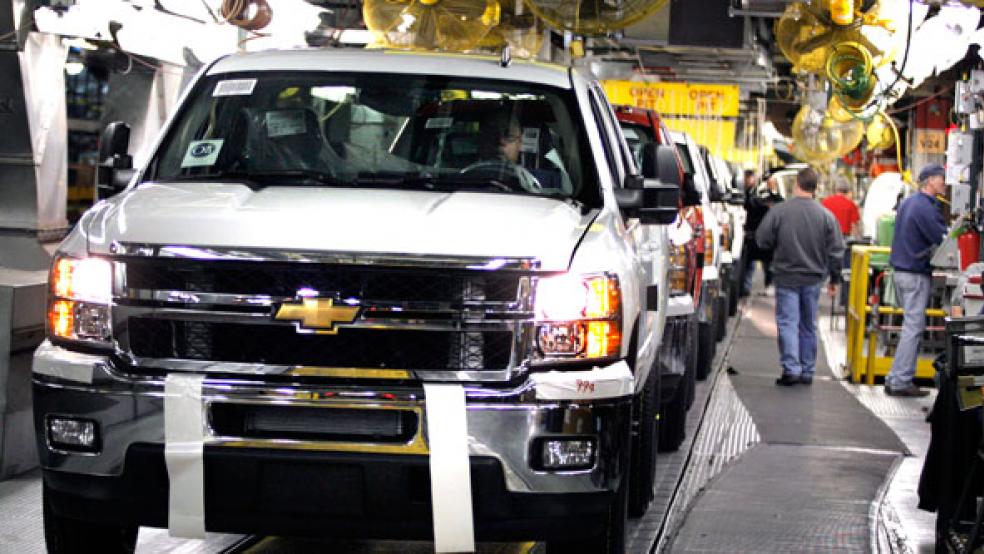General Motors (NYSE:GM) Chief Executive Mary Barra, under fire for what many critics argue was a bungled response to reports of defective ignition switches, has gone on the offensive. Barra on Monday announced three new safety recalls that expand the total number of cars affected to more than 3 million. She also apologized for GM’s missteps and vowed to change the carmaker’s system for handling such decisions.
On Tuesday, Barra named a new vehicle safety chief. "This new role elevates and integrates our safety process under a single leader so we can set a new standard for customer safety with more rigorous accountability," Barra said in a statement.
The moves come after GM ignited a firestorm of negative publicity by defending how it dealt with reports of defective ignition switches linked to 12 deaths, even though it failed to disclose the issue for more than a decade. The Justice Department and two congressional committees have reportedly opened investigations.
Related: Did the Obama White House Protect GM?
Experts in corporate management and crisis communications noted that, by its inaction over such an extended period of time, GM opened itself up to charges that it put people ahead of profits. Changing that view won’t be easy.
“It’s very, very hard,” says Larry Hrebiniak, professor emeritus of management of the Wharton School of the University of Pennsylvania. “Frankly, I don’t envy her.”
Crisis communications experts faulted GM for failing to strike an empathetic tone and not offering an apology that sounded sincere. Barra also failed to keep the story from spreading when she refused to engage the media, which is what experts encourage companies in these situations to do.
“At the end of the day, they need to walk their talk,” says Jonathan Bernstein, the head of Bernstein Crisis Management, a communications consultancy. “When they put profits ahead of safety, they forget that their most important asset isn’t their bank account. It’s their reputation.”
Barra, a GM veteran who became the first woman to head one of Detroit’s Big Three automakers, seems to have finally gotten the message. In a video statement to employees (and made available to the media on the corporate website), she said that “something went wrong with our process in this instance and terrible things happened. As a member of the GM family and as a mom with a family of my own, this really hits home for me. We have apologized, but that is just one step in the journey to resolve this.”
“It’s definitely a step in the right direction,” says crisis communications expert Mike Paul of Reputation Doctor LLC. “I would give her and GM a ‘C’’ overall for how they are handling the crisis. The big problem with the message is that it’s 13 years too late.… How can we be sure that GM has told us the whole truth and nothing but the truth?”
Barra started an internal inquiry to determine why the company failed to report that the defect could cause a sudden drop in power to engines and power systems. The probe also delved into the company’s operations to see if other problems hadn’t been properly disclosed. That resulted in more embarrassing revelations of airbag and brake problems.
The additional recalls announced Monday include 1.18 million SUVs such as the Buick Enclave and GMC Acadia from the 2008 to 2013 model years, Chevrolet Traverse models from 2009 to 2013 and Saturn Outlook models from 2008 to 2010. Also being recalled are 303,000 Chevrolet Express and GMC Savanas from the 2009 to 2014 model years and 63,900 Cadillac XTS full-sized sedans from 2013 and 2014.
That’s in addition to the 1.6 million vehicles that were previously recalled because of defective ignition switches.
GM expects to take a $300 million charge in the current quarter because of the recalls, but the ultimate impact on its reputation isn’t going to be apparent for a while. Competitors are bound to use the issue against the automaker as they compete for sales in a market that’s already cutthroat.
“A customer buying a GM car now has to think twice about what hidden problems they might find,” Hrebiniak said, adding that Barra had little choice but to do an exhaustive review of its internal practices. “It’s a PR nightmare but I still think they have to do it.”
Toyota went through an even worse PR nightmare in 2009 and 2010, when it had to recall millions of cars because of unintended acceleration. The Japanese automaker’s sterling reputation for quality suddenly was sullied. “The Toyota recall was, and still is, the benchmark mammoth recall of our time,” Automotive News noted Monday.
Toyota has slowly, if not fully, recovered from its crisis. Whether General Motors can do the same will depend on whether other surprises emerge from the carmaker…and whether Mary Barra can salvage its image.
This article has been updated to correct Mike Paul's affiliation.
Top Reads from The Fiscal Times:




